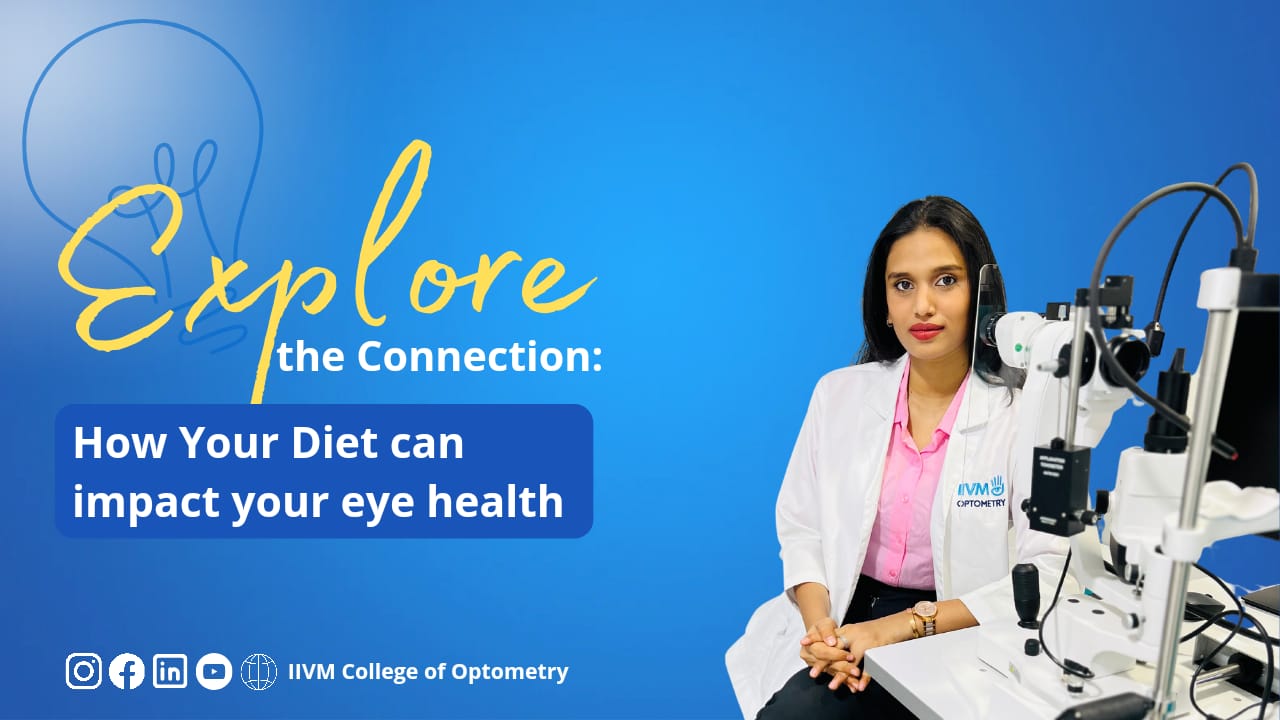Exploring the Connection: How Your Diet Impacts Eye Health
Nutrition plays a crucial role in maintaining eye health and preventing various eye-related issues. The key to maintaining good eye health is eating a balanced diet that is high in vital nutrients. The best Optometry college in India Certain nutrients are essential for supporting good vision and overall eye function.
"What you eat can either be a sight-saver or a sight-ender. Choose wisely"
Here are some key nutrients and their roles in ocular health:
1. Vitamin – A
This is crucial for keeping good vision, especially in low-light conditions. It is a component of rhodopsin protein, which is present in the retina and aids in night vision. vitamin A deficiency may lead to night blindness.
Sources: Leafy green vegetables (kale, spinach, broccoli), orange and yellow vegetables (carrots, sweet potatoes, pumpkin and other winter squash, summer squash), Eggs , Tomatoes, Red bell pepper, Top 10 Paramedical Courses Cantaloupe, mango, Beef liver, Fish oils and Milk
2. Lutein and Zeaxanthin
These are carotenoids, powerful antioxidants that are abundant in the retina, particularly in the macula. They assist in protecting the eyes from harmful light and may lower the risk of cataracts and age-related macular degeneration (AMD).
Sources: Leafy greens including Swiss chard, spinach, and kale. Additionally rich in eye-protective carotenoids are broccoli, asparagus, zucchini, sweet potato, and a variety of colorful fruits like raspberries, papaya, peaches, and mangoes.
3. Omega-3 Fatty Acids:
These healthy fats are important for maintaining the integrity of cell membranes in the eye and supporting proper drainage of intraocular fluid, which may reduce the risk of glaucoma.
Sources: Omega-3s are found in fatty fish like salmon, mackerel, Brussels sprouts, Avocado, nuts, and seeds.
4. Vitamin - C:
This antioxidant helps in maintaining the health of blood vessels in the eyes and supports the overall health of the ocular tissues.
Sources: Oranges, grapefruit, kiwi, strawberries, tomatoes, red and green peppers, and broccoli.
5. Vitamin E:
This antioxidant helps to protect the eyes from oxidative stress and damage caused by free radicals.
Sources: Almonds, sunflower seeds, olive oil, and avocadoes.
6. Vitamin D:
A lower risk of macular degeneration is linked to adequate vitamin D levels. Vitamin D also contains anti-inflammatory properties that may help in overall eye health. Best Optometry Colleges in Coimbatore
Sources: Egg yolk, Beef liver, Sardines, Swordfish, Salmon and Mushrooms.
7. Zinc:
High amounts of this mineral are found in the retina, which aids the transport of Vitamin A from liver to the retina in order to generate melanin, an eye-protective pigment.
Sources: Legumes (beans and lentils), nuts and seeds, meat, seafood, dairy, and eggs are all good sources of zinc.
8. Bioflavonoids:
These compounds can help in improving blood circulation to the eyes and strengthen the blood vessels.
Sources: Celery, parsley, herbs, peppers, berries, pomegranates, plums, grapes, citrus fruits, soybeans, legumes, onions, leeks, Brussels sprouts, kale, broccoli, tea, beans, apples and cocoa
9. Water:
Proper hydration is important for maintaining the equilibrium of eye fluids and preventing dryness.

Remember that while nutrition plays a significant role in eye health, other factors like regular eye exams, protecting your eyes from harmful UV rays, and managing underlying health conditions also contribute to maintaining good vision and overall eye wellness. If you have specific concerns about your eye health, consulting with an eye care professional is always recommended.
For eye care tips and career counselling, follow us on social media pages: IIVM College of Optometry and for free eye tele-consultation, contact +91 99444 89389 (thrivi eye care)
Sources: National Institute of Health, American Optometric Association, Florida Retina Institute


